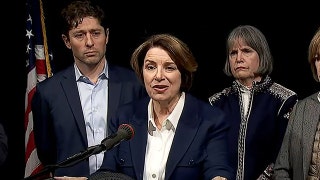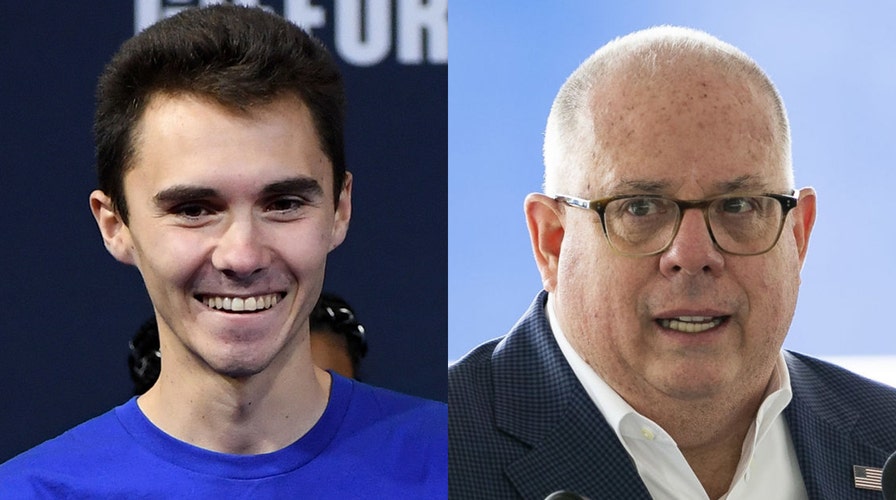Hogan says defunding police 'worst idea' ever, addresses tearing down statues, Trump coronavirus response and more
Maryland Gov. Larry Hogan, in a wide-ranging interview with Fox News ahead of the release of his book next week, said defunding police is 'one of the worst ideas I've ever heard.'
Maryland Gov. Larry Hogan, a Republican, got into a tense exchange with former Parkland student and gun control activist David Hogg at a Harvard Institute of Politics event Thursday night over Hogg's accusation that Hogan cares more about investing in police than helping minority communities.
Hogan, amid rumors he is considering a 2024 presidential run, is promoting his new book "Still Standing" in which he touts his handling of the Freddie Gray riots in 2015, frames himself as a strong backer of police and as an ally of minority communities. In his book, Hogan portrays his relationship with the Black communities in Baltimore positively, saying they appreciate that he has sought to stop the violence there and that he takes the time to listen to their grievances -- he says former New Jersey Gov. Chris Christie gave him advice that he needed to be a "consoler-in-chief" after the Freddie Gray riots.
But Hogg challenged Hogan on his support for police, saying "more than anything [gun violence] is a problem of systemic racism and historic injustice, given that the number one predictor of where gun violence occurs most in the United States is where communities were redlined in the 1930s and '40s." Hogg added that Hogan killed the planned light rail "Red Line" in Baltimore and refused to invest other money in "communities that are most affected by gun violence."
HOGAN SAYS DEFUNDING POLICE 'WORST IDEA' EVER, DECRIES 'HANDS-OFF APPROACH' TO RIOTS IN INTERVIEW
"You seem very willing to invest in police and give them hundreds of millions of dollars, but when it comes to investing in these communities with these bills, you didn't do that?" Hogg asked.
Hogan told Hogg that he agreed with him that more needs to be done on "root causes" of violence in the inner-city, but said those same inner-city residents support the governor's crime-stopping measures
"But while we 're working -- as we have, this takes decades to change -- while we're working to fix those problems we also have to stop the shootings and the murders and I can tell you that 90 percent of the residents of Baltimore City and 90 percent of the African Americans of Baltimore City supported my crime bills to crack down on the violent crime," Hogan said. "So this is not just me having a different opinion than you, this is everyone in Baltimore having a different opinion than you."
Hogan also addressed the other elements of Hogg's question about investments the activist said he didn't make in minority communities. The governor said that he has invested more money in Baltimore than other Maryland governors, including "record investments in education" and money for job training. He added his investments in police are "trying to address the immediate problem of stopping the 350 people murdered."
3 CHICAGO COPS SHOT OUTSIDE POLICE STATION DURING ARREST, SUSPECT ALSO HIT, AUTHORITIES SAY
As Hogan detailed further action he says he's taken in Baltimore, Hogg pushed back, asking him to address the scrapped Red Line in the city.
"Let me just finish, because you had a very long question there," Hogan replied. "On the Red Line, the previous governor, who was the former mayor of Baltimore, didn't build it for eight years because it never made any sense. The Washington Post editorial board said it was a boondoggle that never made any economic or transportation sense."
Hogan continued that he had spearheaded the creation of the "Purple Line," a new D.C. Metro line under construction connecting many of the areas northeast of D.C. with other Metro lines.
"I did build the Purple Line which is in some of our poorest communities in Prince Geroge's County, our largest minority population in the state which is one and a half times larger than Baltimore city just outside of Washington. So I'm not opposed to investing in transit systems that work, it's just that one did not make any sense in Baltimore," Hogan said.
CLICK HERE TO GET THE FOX NEWS APP
This year has seen an uptick in gun violence in many cities, along with a number of protests against racial injustice and police brutality after the death of George Floyd while in the custody of the Minneapolis Police Department. One officer was charged with second-degree murder over Floyd's death, while three others were charged as accessories to the alleged crime.
Hogan, in his book and in a slew of media appearances, has advocated for investments in police and a tough approach to crime. But many on the left, like Hogg, say that policing itself is the issue, noting African-Americans are much more likely to die at the hands of police than white people. Some have even gone as far as advocating for the defunding of police or the wholesale dismantling of police departments and replacing law enforcement with a public safety model that would send unarmed professionals to deal with things like domestic disputes.
"It's one of the worst ideas I've ever heard," Hogan said of defunding the police in an interview with Fox News last week. "If you want to go after the problems in inner cities and the violent crime and the murders, we've got to have more police... If you want to try to recruit and have more diversity, you've got to invest more. If you want better training and better equipment and you want, you know, body cams and you want people to have the training and de-escalation, all of that takes money."














































